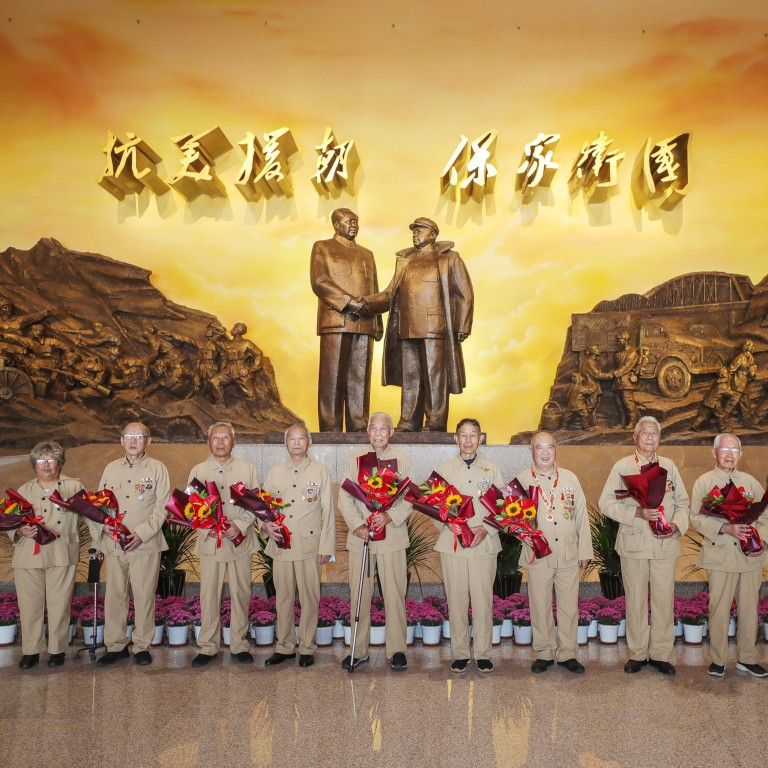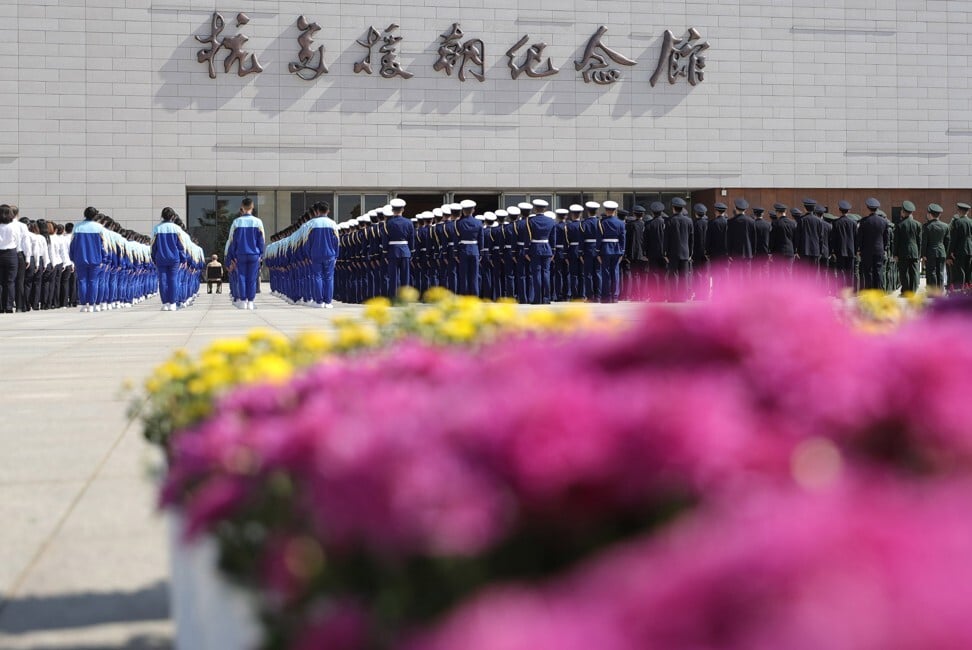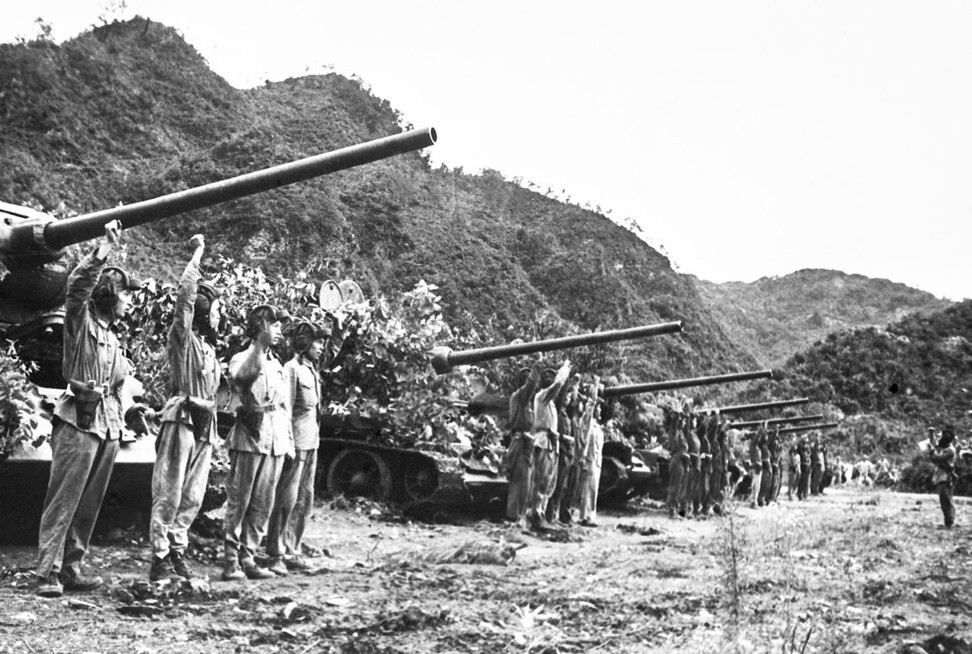
The Korean war: China’s reminder of strength against the US
- Conflict 70 years ago is perceived in China as a watershed moment, the end of a ‘century of humiliation’ and being victimised by foreign invaders
- Korean war memorial in Dandong has endured through dramatically shifting geopolitics and alliances between China, North Korea and the US
A national memorial dedicated to China’s first and only war against the United States 70 years ago reopened at the weekend amid fears that a new cold war between the two superpowers may actually turn hot.
The Memorial Hall of the War to Resist US Aggression and Aid Korea in Dandong, a northeastern Chinese city on the border with North Korea, is open after an unusually long hiatus of six years.
It also underlines how China tries to seize the historical narrative through war remembrance, which has closely mirrored the ups and downs of Beijing’s love-hate relationship with Washington and its changing perception of the world.
How the Korean peninsula was divided
East China Normal University history professor Shen Zhihua said that despite all the changes in the past decades, the Korean war was still relevant, especially given that it had yet again become the prime target of Washington’s dangerous brinkmanship.
“I don’t believe anyone wants a war, but in the face of the mounting pressure from the US it serves as a timely reminder that the Chinese are not afraid of armed conflicts with a much stronger enemy, despite great disparity in strength,” he said.
Shen is an acclaimed author on the subject of the Korean war and has tried to decode the notoriously secretive history behind Mao Zedong’s decision to send nearly three million Chinese troops to cross the Yalu River by stealth and rush to Pyongyang’s aid on October 19, 1950.
Kim Jong-un marks anniversary of Korean war armistice by handing out pistols
“After all, it was a war that had been forced upon the Chinese people according to the official narrative, when the US troops obviously ignored China’s warnings and crossed the 38th parallel and advanced to the Chinese border,” he said.
Tang Wenfang, head and chair professor of social science at the Hong Kong University of Science and Technology, said the US would have to think twice before getting involved in a possible armed confrontation with “a very determined and much stronger China today”.
“This event is particularly relevant in the increasing interference of the US in Taiwan in recent years, which is likely to prompt China to use force to reunify with Taiwan and unavoidably face American military intervention,” Tang said.

While the Korean war may be “the forgotten war” in the US and many other parts of the world, it has long been one of the most remembered wars in the official history of the People’s Republic.
The reopening of the war memorial is one of a series of official events marking the 70th anniversary next month of China’s participation in the war, according to state news agency Xinhua.
A large-scale exhibition is expected to open at the Military Museum of the Chinese People’s Revolution in Beijing on October 19.
President Xi Jinping is expected to attend a gathering in Beijing at the culminating official commemoration on October 25, the date the Chinese army launched the first attack against the United Nations coalition forces led by the US. State media has reported that memorial medals will be awarded to war veterans known as the Chinese People’s Volunteers (CPV) and if confirmed it would make Xi only the second top Chinese leader to attend a Korean war commemoration after Jiang Zemin did so 20 years ago.

China’s death toll in the war has long been a secret. Official figures have been challenged as significantly downplaying the actual number of fatalities. Beijing has said for years that 360,000 soldiers were either killed or wounded, without providing a breakdown of how many died. The museum in Dandong put the death toll at 183,108.
Despite suffering much heavier casualties than the US, China pushed the US and the coalition forces back to the 38th parallel and forced its much stronger enemy to sit down at the negotiation table.
“The Korean war is no doubt a powerful memory in the Chinese mind of determination and courage of confronting the powerful and arrogant America. This is a psychological victory that China still enjoys today,” Tang said. “The reopening also reminds people in China and the US that ‘the American imperialists are paper tigers’, as Mao used to say.”
But David Tsui, a Hong Kong-based North Korean affairs expert and son of a People’s Liberation Army general, cautioned against attempts to overestimate China’s chances of defeating the US in another war.
“With the US ratcheting up tensions with China on almost every front and lining up an international coalition against Beijing, it is no longer an illusion that the two countries are on the brink of a real military conflict rather than a cold war, especially if American President Donald Trump gets re-elected,” he said.
He noted Xi’s scathing attack on the US early this month, when the Chinese leader vowed to fight back against Washington’s attempts to encircle China and challenge the party’s leadership.
“Given the gaps between the two countries over their capabilities, I doubt anyone would seriously believe China can outmanoeuvre the US again,” Tsui said.
Tsui said the Korean war was a watershed moment for China, emerging as a major power and putting an end to China’s “century of humiliation” of being victimised by foreign invasions.
That partly explained why the party has insisted on naming it as “the war to resist US aggression and aid Korea”, instead of the universally accepted Korean war.
The Chinese renaming of the war, according to Zhao Ma, a Korean war expert in the US, smacks of China’s historical revolutionary discourse of “friends and foes” under Mao during the Cold War.
“[It] crystallised the image of Washington as revolutionary China’s arch-enemy in the official narrative and recent memories of the war,” said Ma, an associate professor of modern Chinese history and culture at Washington University in St Louis.
Beijing has since tried to tone down the original revolutionary narrative, especially after the China-US rapprochement beginning in the early 1970s.
The memorial, first built in 1958, has endured through a dramatically shifting geopolitical landscape in the US-China-North Korean triangle over the years.
When it moved to the present site in 1993 – a year after China normalised official ties with South Korea to the ire of the communist North – authorities softened their anti-American posture. Old references to the US such as “imperialist invaders”, “war-peddlers” and “war criminals” were dropped, according to Ma.
An end to Korean war in return for Pyongyang’s denuclearisation?
Renovation was given as the reason for the memorial closing in December 2014, as relations between the communist neighbours suffered another blow following Xi’s historic debut visit to Seoul in July 2014. However, Beijing’s estranged ties with Pyongyang were a major boost for the US-China relations which had been fraught over trade and cybersecurity and Beijing’s territorial claims over the South and East China Sea.
“The Korean war in China’s national memory has shifted from a socialist crusade to a nationalist mission,” Ma said, citing the rise of nationalism and even jingoism under Xi.
While the Korean war continues to serve a political purpose in China, things are quite different in America, according to Joe Renouard, resident professor of American studies at Hopkins-Nanjing Center of Johns Hopkins University.
For China, “despite the war’s appalling human toll and its ambiguous conclusion, it stands in popular memory as a victory against a technologically and materially superior enemy, and it is central to the national origins story of the People’s Republic”, Renouard said.
“In times of China-US friction, Chinese officials and pundits may point to the Korean war as an example of how China can successfully fend off American aggression,” he said, adding that the war served as both a point of national unity and a dig at America when convenient.
Drawing attention to the war seemed to be a convenient and effective way to highlight China’s willingness to stand up to foreign adversaries, he said.
Yet this message might not be entirely clear in Washington and few Americans were aware of the dynamic of “the forgotten war”.


